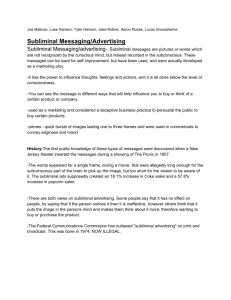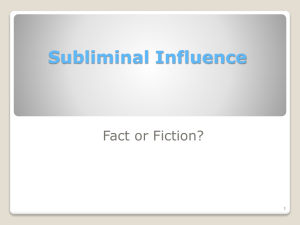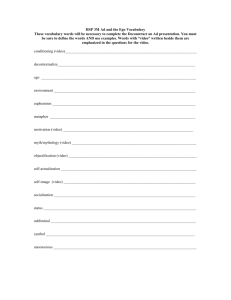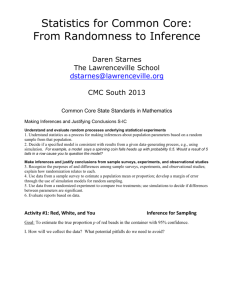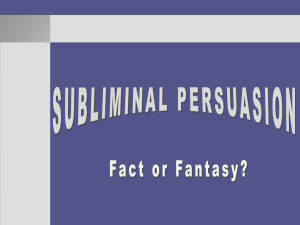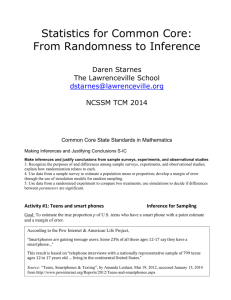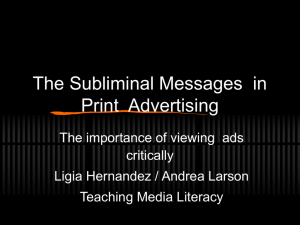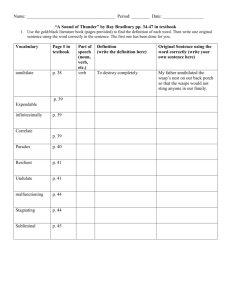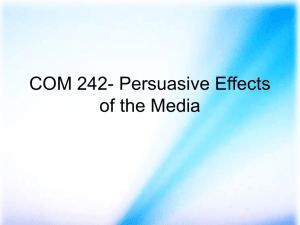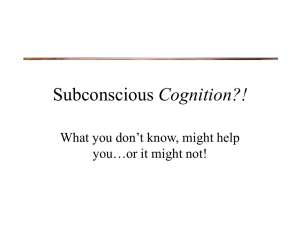File
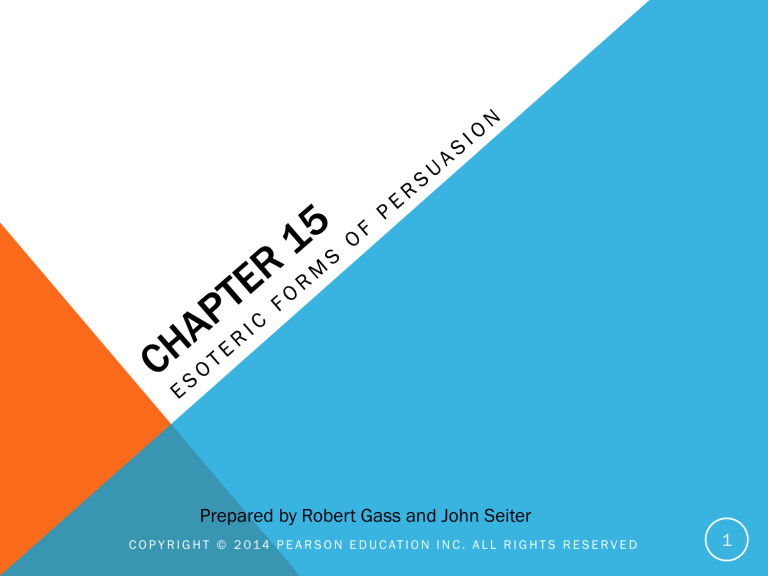
Prepared by Robert Gass and John Seiter
C O P Y R I G H T © 2 0 1 4 P E A R S O N E D U C AT I O N I N C . A L L R I G H T S R E S E R V E D
1
COLOR AS PERSUASION
Color has symbolic meaning
At birth, girls are wrapped in pink blankets, boys in blue
Patriotic colors
Executives wear “power “colors
Fans identify with sports teams through color
Jobs are categorized as “white collar,” “blue collar,” “green collar,” “pink collar,” etc.
C O P Y R I G H T © 2 0 1 4 P E A R S O N E D U C AT I O N I N C . A L L R I G H T S R E S E R V E D
2
COLOR AND ATTITUDES
Colors have attitudinal associations
In old westerns, good guys wear white hats, bad guys wear black
Brides wear white to symbolize purity
Red is associated with sexiness
Black attire signifies formality
Going “green” is trendy and eco-conscious
C O P Y R I G H T © 2 0 1 4 P E A R S O N E D U C AT I O N I N C . A L L R I G H T S R E S E R V E D
3
COLOR AND ASSOCIATIONS
Negative connotations of the word “black” black sheep blackball blacklist black cat black heart black humor black comedy blackmail black day black eye black widow black mark
Positive associations with the word “black” black tie event little black dress in the black black belt black Friday
______ is the new black
C O P Y R I G H T © 2 0 1 4 P E A R S O N E D U C AT I O N I N C . A L L R I G H T S R E S E R V E D
4
SEEING RED
Attitudinal associations with the color red
A red dress is associated with sexiness
The “red pen” effect in grading papers
Stereotypes about redheads or “gingers”
Red is associated with danger, hazards, warnings
A red cross symbolizes a hospital
C O P Y R I G H T © 2 0 1 4 P E A R S O N E D U C AT I O N I N C . A L L R I G H T S R E S E R V E D
5
COLOR AND BRANDING
McDonald’s
Golden arches
T-Mobil
Bright magenta
Tiffany
Robin’s egg blue
Livestrong Foundation
Yellow bracelets
Susan G. Komen Foundation
Pink ribbon
Product Red
John Deere tractors are easily recognizable by their patented green and yellow colors
C O P Y R I G H T © 2 0 1 4 P E A R S O N E D U C AT I O N I N C . A L L R I G H T S R E S E R V E D
6
COLOR AND RACE/ETHNICITY
Colorism
Colorism refers to the use of skin tone as a status marker
Interracial prejudice surrounds skin color
“Whiteness” is often privileged over “Blackness”
Slavery and segregation in the
U.S.
India’s caste system
Brazilian expression, “Money whitens”
Color complex
Refers more to intra-racial color prejudice
Belief in the superiority of light skin, European hair,
Anglo facial features
Phenomenon known as
“passing”
“bleaching syndrome” using products to lighten one’s skin
C O P Y R I G H T © 2 0 1 4 P E A R S O N E D U C AT I O N I N C . A L L R I G H T S R E S E R V E D
7
COLOR AND EMOTION
We often equate colors with moods
seeing red
green with envy
feeling blue
tickled pink
Ambient colors can affect moods ,emotions
Primary colors: bold, lively, energetic
Pastels: calming, relaxing
Warm colors; red, yellow, orange
Cool colors; blue, green, purple
C O P Y R I G H T © 2 0 1 4 P E A R S O N E D U C AT I O N I N C . A L L R I G H T S R E S E R V E D
8
COLOR AND BEHAVIOR
Color and behavior
Food coloring is used to make many foods more appealing; cheese meat, produce
Food color signifies freshness, quality, taste
Flavor preference
People snacked more when eating from blue plates than red plates
Hot chocolate tasted better in an orange or dark cream cup than a red or white cup
(Piqueras-Fiszman & Spence
(2012)
Red pen effect; exposure to the color red activates negative attitudes, harsher grading
Color-aggression link
Some evidence suggests that wearing black uniforms correlates with aggressive behavior
Color and traffic tickets
Despite conventional wisdom, red cars are not more prone to traffic tickets
C O P Y R I G H T © 2 0 1 4 P E A R S O N E D U C AT I O N I N C . A L L R I G H T S R E S E R V E D
9
SUBLIMINAL INFLUENCE
75% of Americans believe that subliminal messages are omnipresent in advertising, and that they work (Rogers & Seiler,
1994)
Why?
James Vicary’s alleged movie theater experiment in 1957
Wilson Brian Keys claims of planted images in advertising
Subliminals in Disney movies and other media
Media spoofs of subliminals
C O P Y R I G H T © 2 0 1 4 P E A R S O N E D U C AT I O N I N C . A L L R I G H T S R E S E R V E D
10
TYPES OF SUBLIMINAL MESSAGES
1.
Embedded images: pictures or words that are hidden or flashed quickly (in 100ths of a second)
2.
Sub-audible messages: sounds or words that are too faint to be heard, or are played at extremely high frequencies
3.
Electronically altered signals: backward masking and other voice alterations
C O P Y R I G H T © 2 0 1 4 P E A R S O N E D U C AT I O N I N C . A L L R I G H T S R E S E R V E D
11
DEFINITIONS AND CONCEPTUALIZATIONS
Subliminal message
Below (sub) the threshold (limen) of human perception
Example: a message flashed so quickly that it can’t be recognized
Example: a sound played so faintly that it can’t be heard
Embedding is a form of subliminal influence
Supraliminal message
A message that is consciously recognized and processed
Example: an image so faint that it is difficult to see
Example: a sound that is played quietly, yet is still audible
Product placement is a form of supraliminal influence
C O P Y R I G H T © 2 0 1 4 P E A R S O N E D U C AT I O N I N C . A L L R I G H T S R E S E R V E D
12
THE EARLY YEARS: A MYTH IS BORN
James Vicary claimed to have flashed the words “eat popcorn” and “Drink
Coca-Cola” on a movie screen
He claimed popcorn sales increased
58% and Coke sales increased 18%
Vicary’s experiment was never successfully replicated
He later acknowledged the study was a hoax
C O P Y R I G H T © 2 0 1 4 P E A R S O N E D U C AT I O N I N C . A L L R I G H T S R E S E R V E D
13
WHY THE FASCINATION?
The prospect of “mind control” is frightening
It’s fun to entertain conspiracy theories
The popular press sensationalizes the issue
There are just enough isolated cases to keep the myth alive
However, the mere existence of subliminal images, does not prove their effectiveness
Methodological shortcomings
lack of control groups
lack of double-blind procedures
possibility of bias or cueing
lack of replication
lack of rigorous “blind” review
C O P Y R I G H T © 2 0 1 4 P E A R S O N E D U C AT I O N I N C . A L L R I G H T S R E S E R V E D
14
WHAT ADVERTISERS REALLY DO
Product placement is commonplace
Product placement is a form of supraliminal persuasion
Product placement may be subtle, but it is not subliminal
The brand’s sponsors want viewers to recognize their brands
C O P Y R I G H T © 2 0 1 4 P E A R S O N E D U C AT I O N I N C . A L L R I G H T S R E S E R V E D
15
SUBLIMINAL PRIMING
Subliminal priming has been well documented in controlled laboratory settings
Stimuli can be perceived or processed without conscious awareness
Priming can produce changes in beliefs, attitudes, and behavior
Commercial applications of subliminal priming have not been demonstrated
Flashing “Starbucks” will not make a consumer buy that brand of coffee
C O P Y R I G H T © 2 0 1 4 P E A R S O N E D U C AT I O N I N C . A L L R I G H T S R E S E R V E D
16
SUBLIMINAL PRIMING
Priming occurs when a word is flashed quickly, then masked or covered up
The primed word is shown too quickly to be consciously recognized
The mask is removed and subjects see how quickly they recognize the word
Subjects who are primed recognize the word faster than subjects who are not primed mask
#### prime
SALT
C O P Y R I G H T © 2 0 1 4 P E A R S O N E D U C AT I O N I N C . A L L R I G H T S R E S E R V E D
17
AN EXAMPLE OF A PRIMING STUDY
Patton (1992) exposed “normal” and “bulimia prone” females to one of three subliminal messages:
A. “Mama is leaving me” (Separation anxiety message)
B. “Mona is loaning it”
C. “Mama is loaning it”
Afterward, the females were invited to participate in a taste-test involving crackers
The “bulimia prone” females who were exposed to message A ate twice as many crackers as the females in the other two groups
C O P Y R I G H T © 2 0 1 4 P E A R S O N E D U C AT I O N I N C . A L L R I G H T S R E S E R V E D
18
CAUTIONS REGARDING SUBLIMINAL PRIMING
priming effects are short-lived
The subliminal prime must still be perceived, even if perception is without awareness
There is no proof of commercial viability
Beware of the fallacy that “presence” implies
“effectiveness”
Even in controlled laboratory settings, subliminal effects tend to be weak and transitory
Difficulty of proving a negative (e.g. that there aren’t subliminals everywhere)
C O P Y R I G H T © 2 0 1 4 P E A R S O N E D U C AT I O N I N C . A L L R I G H T S R E S E R V E D
19
NEUROLINGUISTIC PROGRAMMING (NLP)
NLP is touted by motivational speakers and self-help books
Proponents claim that certain words possess nearly hypnotic power
People supposedly rely on internal representations which favor one sense over another
Words can appeal to visual, kinesthetic (tactile and visceral), auditory, olfactory, gustatory (taste) senses
Representational systems can be “read” via nonverbal cues or “accessing cues”
A person who looks up is relying on visual processing
A person who looks horizontally is relying on auditory processing
C O P Y R I G H T © 2 0 1 4 P E A R S O N E D U C AT I O N I N C . A L L R I G H T S R E S E R V E D
20
NEUROLINGUISTIC PROGRAMMING (NLP)
There is no evidence that certain words have a hypnotic effect on people
The direction of a person’s gaze is not a reliable sign of his/her thinking process
7 out of 8 studies examining a link between information processing and eye movements found no evidence supporting NLP’s predictions (Witkowski,
2012, p. 36)
“the vast majority of research studies have not supported either the fundamental tenets or the techniques of NLP” (Witkowski, 2012, p. 37)
C O P Y R I G H T © 2 0 1 4 P E A R S O N E D U C AT I O N I N C . A L L R I G H T S R E S E R V E D
21
MUSIC AS PERSUASION
Music can function as a mnemonic device or memory aid
Background music can
affect shopping pace
enhance moods
improve task performance
C O P Y R I G H T © 2 0 1 4 P E A R S O N E D U C AT I O N I N C . A L L R I G H T S R E S E R V E D
22
MUSIC AS PERSUASION
Music can function as both a central and peripheral cue
Music is widely used in advertising
The mere exposure effect
Repeated exposure to a novel stimulus, such as a jingle, increases liking for the stimulus.
Music as a mnemonic device
Like a good neighbor________ is there
Break me off a piece of that _________ bar
Background music
Affects mood, shopping behavior
Risk of habituation (desensitization)
C O P Y R I G H T © 2 0 1 4 P E A R S O N E D U C AT I O N I N C . A L L R I G H T S R E S E R V E D
23
MUSIC VIDEOS
Critics charge that rock and rap videos promote:
materialism
drug use
violence
sexual objectification of women
Advocates claim music videos:
empower subcultures
offer social commentary
mirror problems already present in society
C O P Y R I G H T © 2 0 1 4 P E A R S O N E D U C AT I O N I N C . A L L R I G H T S R E S E R V E D
24
WEAPONIZING MUSIC
Loud, blaring music was used during enhanced interrogations
Unpopular music has been used to discourage loitering
Driving away adolescents with classical music
C O P Y R I G H T © 2 0 1 4 P E A R S O N E D U C AT I O N I N C . A L L R I G H T S R E S E R V E D
25
AROMA AND PERSUASION
The fragrance industry is selling romance in a bottle
Fragrances function as peripheral cues
Studies on the effectiveness of fragrances are mixed
Aromas have been shown to:
alter moods
improve task performance
make shoppers linger in stores
C O P Y R I G H T © 2 0 1 4 P E A R S O N E D U C AT I O N I N C . A L L R I G H T S R E S E R V E D
26
AROMA AND PERSUASION
Caveats and cautions
Smell preferences are highly idiosyncratic
Overreliance on smells could produce desensitization
Smells may result in counter-conditioning
(boomerang effect)
Some people are sensitive to smells (allergies, gag reflexes, etc.)
C O P Y R I G H T © 2 0 1 4 P E A R S O N E D U C AT I O N I N C . A L L R I G H T S R E S E R V E D
27
